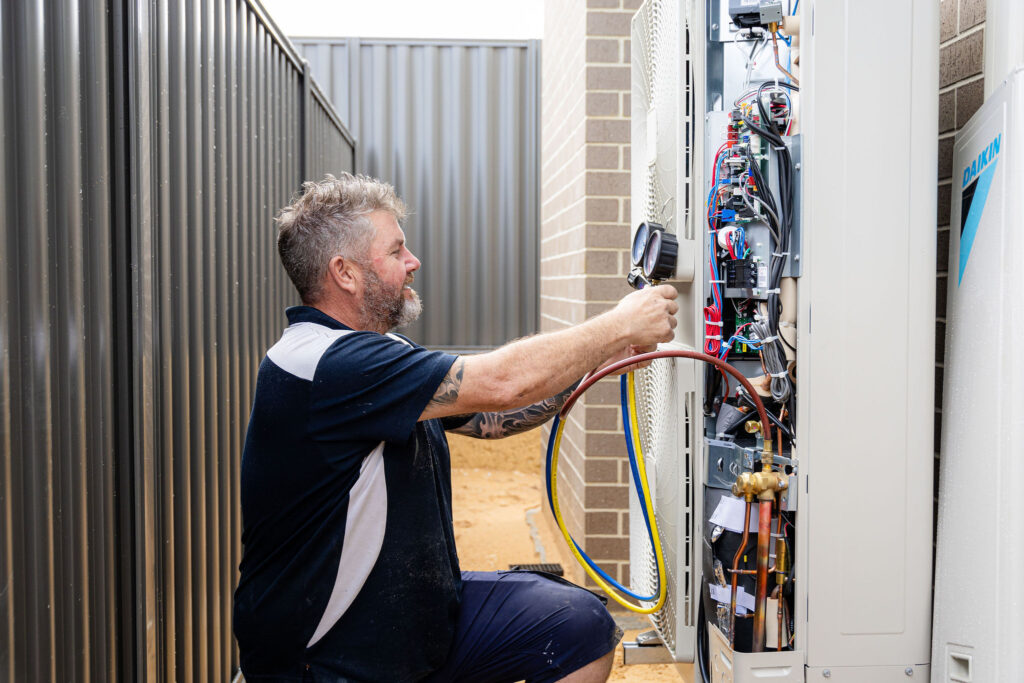01/10/2025
Top 5 Air Conditioning Myths Debunked for Smarter Usage

Think you know how to best use your air conditioner? Let’s dive into 5 air conditioning myths that might be costing you money and comfort, and separate fact from fiction.
Myth: Bigger Air Conditioners Provide Better Heating/Cooling

It might seem logical that if a small air conditioner can cool one room, then a larger one should cool or heat the entire house faster, right? But that’s a common misunderstanding when it comes to choosing the right air conditioning system. In reality, installing a unit that’s too large for your space can cause more harm than good.
What Happens When Your Air Conditioner Is Too Big?
When the capacity of the air conditioner is too large, the air conditioning units often suffer from a problem called short cycling. This happens when the system cools or heats the area too quickly, causing it to shut off and restart too frequently. These rapid cycles don’t just waste energy—they can also lead to uneven cooling and increased wear on the unit’s components. Over time, this can shorten the lifespan of the system and could leave you with costly repair or replacement bills.
Humidity Becomes a Problem, Too
One of the key functions of an air conditioner, besides controlling temperature, is dehumidifying the air. A properly sized system runs long enough to remove moisture from the air as it cools, leaving your home feeling fresh and comfortable. But when a unit is too large, it reaches the desired temperature quickly and shuts off before it can extract enough humidity. The result is a cool room that still feels sticky or damp.
Bigger Isn’t Always Cheaper to Run
You might think you’re getting more power for your money, but a system that’s too powerful for your space is actually less energy efficient. Constant on-and-off cycling uses more electricity, drives up your energy bills, and increases the likelihood of mechanical failures. It’s a lose-lose situation—less comfort, more costs.
The Right Size = Maximum Comfort + Efficiency
A well-sized air conditioning system is designed to operate for consistent periods, delivering even temperatures and properly managing indoor humidity. It reduces energy consumption, extends system lifespan, and creates a comfortable environment all year round.
If you’re considering an upgrade, don’t fall for the “bigger is better” myth. Instead, consult a professional to ensure your air conditioner is perfectly sized to suit your home and lifestyle needs. Enquire with WA’s most awarded air conditioning company today.
Myth: Lowering the Set Point on the Controller Cools the Room Faster
Many people believe that setting their Set Point on the Controller to a lower temperature will cool their room faster. This common myth stems from the assumption that the lower the setting, the quicker the cooling. However, this isn’t how air conditioners work. Air conditioners both cool and heat at the same speed regardless of the thermostat setting. Lowering the thermostat or raising it doesn’t accelerate the cooling or heating process; it merely sets a further target temperature for the unit to reach. So, cranking the thermostat to an extreme temperature won’t make your room cool or heat any faster, but it will increase your energy consumption. If you’re looking for Summer air conditioning running tips, be sure to read our blog post below.
Can The Temperature Be Too Low?
An excessively low thermostat setting forces your air conditioner to run longer than necessary, increasing energy costs. This prolonged operation not only spikes your energy bills but also puts additional strain on the system, increasing wear on its components.
Additionally, extremely low thermostat settings can create an uncomfortably cold environment, especially if the air conditioner runs continuously to reach the desired temperature. This cooling effect can make your living space feel more like a freezer than a comfortable retreat from the cold air and heat.
Maintaining moderate temperature settings helps achieve efficient cooling and a comfortable healthier indoor environment. Smart controllers, like the AirTouch 5, and proper temperature management can help you reach desired comfort levels without wasting energy. Remember, patience and proper thermostat settings are key to efficient cooling.
Myth: Air Conditioners Are Expensive to Operate

Many people believe air conditioning systems are costly to operate, but that’s no longer the case with today’s technology. Modern air conditioning units, especially those with inverter technology, are designed for energy efficiency and cost-effectiveness.
What Is An Inverter?
Inverter systems adjust their power output based on your home’s needs—meaning they run more efficiently and maintain consistent temperatures. This reduces energy consumption, cuts down wear on components, and helps lower your electricity bills.
Maintenance Keeps Costs Low
Regular servicing is key to efficiency. Cleaning filters, checking refrigerant levels, and ensuring good airflow can help your air conditioner perform better and last longer—all while keeping your energy bills in check.
Myth: Air Conditioners Don’t Need Regular Maintenance

Some people think that once an air conditioner is installed, it can be left to run indefinitely without any maintenance. This myth can lead to decreased performance, higher energy bills, and even system failure over time. Regular maintenance is essential for the optimal performance of air conditioning systems. Neglecting this maintenance can shorten the lifespan of the unit and increase energy consumption. Regularly servicing your air conditioner ensures it runs efficiently, providing you with consistent and reliable cooling.
What Sort Of Maintenance is Needed?
Maintenance tasks should include cleaning or replacing your return air filters and inspecting both indoor and outdoor units. Additionally, checking refrigerant levels is also important. These tasks help to maintain proper airflow, prevent excessive noise, and ensure the system operates smoothly with outside air.
Moreover, regular maintenance helps keep your air conditioner in compliance with warranty requirements set by manufacturers. This means that if something goes wrong, you’re more likely to be covered under warranty, saving you the cost of expensive repairs.
Regular maintenance isn’t just a good practice; it’s a necessity. By keeping up with routine maintenance, you can improve indoor air quality, ensure your system operates efficiently, and extend the life of your air conditioning unit.
Myth: Turning Off Your Air Conditioner When You Leave Saves More Money
Many people believe that switching off their air conditioner entirely when they leave the house will result in big energy savings. It seems logical, right? If the unit isn’t running, it’s not using power. But this isn’t always the most cost-effective strategy—especially in Perth’s scorching summer climate.
When an air conditioner is turned off completely during the day, indoor temperatures can rise dramatically. By the time you return home, the system must work significantly harder and run for longer periods to cool the space back down to a comfortable level. This intense effort often results in greater energy consumption compared to simply maintaining a steady, moderate temperature throughout the day.
Modern air conditioning systems, particularly those with inverter or smart technology, are designed to operate efficiently at partial load. Rather than shutting down entirely, setting your thermostat a few degrees higher while you’re out—around 25–27°C—keeps the system running at a lower capacity, preventing extreme temperature build-up and reducing energy spikes when you return.
Smart thermostats and programmable systems take this one step further by learning your habits and automatically adjusting the temperature based on your schedule. This ensures consistent comfort while optimising energy use without manual intervention.
In short, turning your system off completely might feel like you’re saving money, but it can actually cost you more in the long run. Managing your settings smartly is a better way to balance comfort and efficiency.
Summary
Throughout this blog post, we have debunked several common air conditioning myths that can lead to inefficiencies and higher energy bills. From the misconception that bigger air conditioners provide better cooling to the belief that lowering the thermostat cools the room faster, we’ve seen how these myths can impact your comfort and finances.
By understanding the truth behind these myths, you can make smarter cooling decisions, ensuring your air conditioning system operates efficiently and effectively. Regular maintenance, proper sizing, and smart thermostat settings are just a few ways to achieve optimal performance and energy savings. Embrace these insights for a more comfortable and cost-effective cooling experience.
Frequently Asked Questions
1. How can a large air conditioner be inefficient?
When an air conditioner is too large it becomes inefficient because it causes short cycling, which results in increased energy consumption and poor humidity control. This can lead to discomfort and higher utility bills.
2. Will setting my thermostat lower cool my room faster?
Adjusting the setpoint on the controller lower will not cool your room faster; air conditioners operate at a consistent speed regardless of the thermostat setting. For optimal energy efficiency, set your thermostat to your desired temperature instead.
3. Are modern air conditioners expensive to operate?
Modern air conditioners are generally energy-efficient and cost-effective, making them less expensive to operate compared to older models. Selecting a unit with a high SEER rating can further reduce operating costs.
4. Is regular maintenance necessary for my air conditioner?
Regular maintenance is essential for ensuring your air conditioner’s optimal performance and extending its lifespan. Neglecting it can lead to costly repairs and decreased efficiency.
5. Does turning off the air conditioner when you leave save money?
Not always—completely shutting off your system can cause your home to overheat, forcing the unit to work harder (and use more energy) when you return. Setting a higher temp instead keeps energy use steady and efficient.